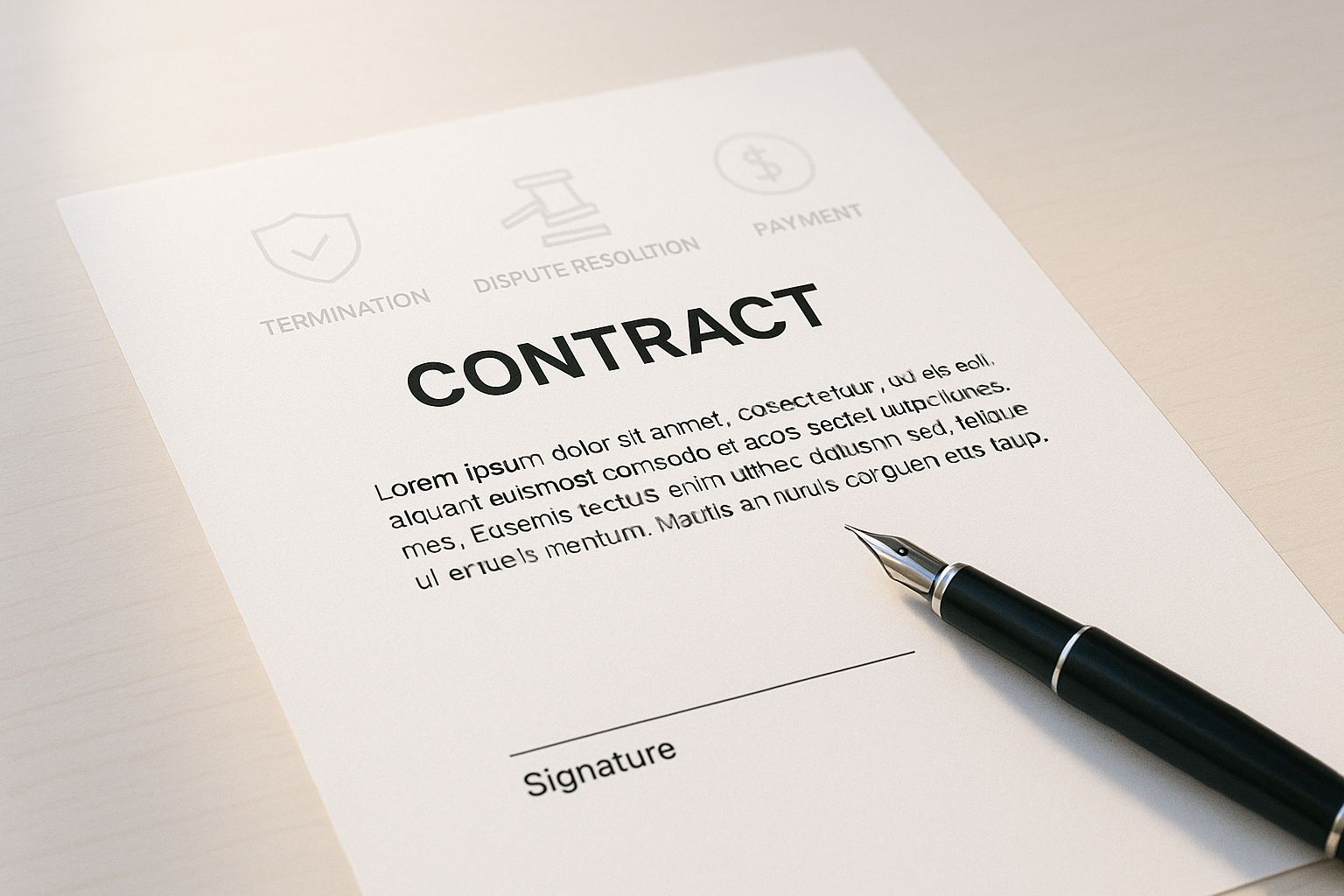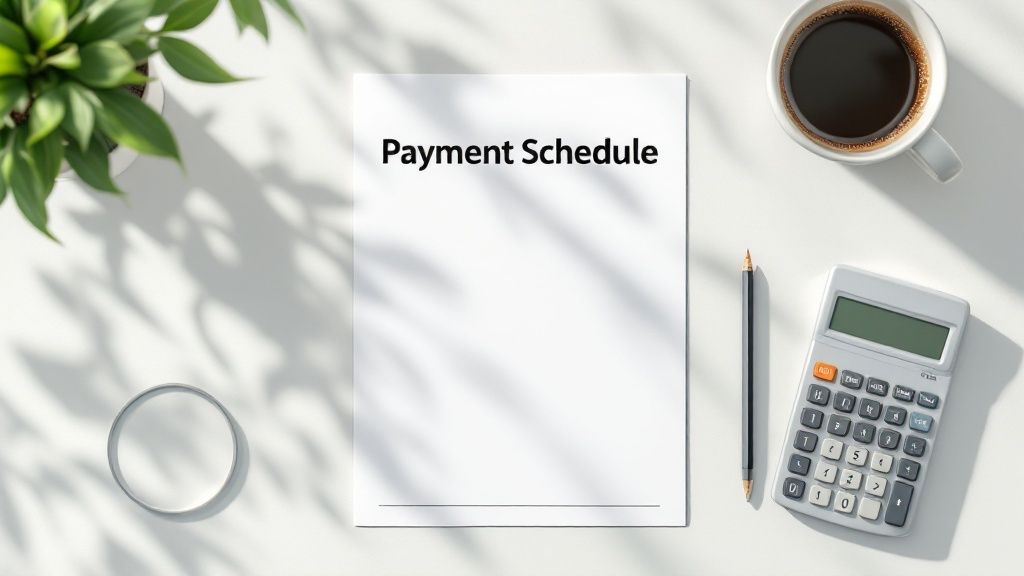Think of an event venue contract template as the master playbook for your event. It’s a pre-written document that lays out all the terms and conditions between you (the host) and the venue. This isn't just bureaucratic paperwork; it’s the agreement that turns a simple booking into a secure, professional partnership, protecting everyone from headaches and confusion down the road.
Why Your Event Needs a Rock-Solid Venue Contract
In the world of professional events, a handshake deal just won’t cut it. Relying on a verbal agreement is a huge gamble that can lead to disaster. A solid contract is your safety net, clearly spelling out everyone’s duties, rights, and what to expect.
The Blueprint for a Successful Event
You wouldn't build a house without a blueprint, right? Imagine the chaos—plumbers and electricians guessing where things should go. An event without a contract is the same kind of mess.
This document gets into the nitty-gritty, covering everything from the exact date and time you get access to the space to what happens if the A/C gives out in the middle of your keynote speaker's presentation. It ensures you and the venue are on the exact same page.
For major life events, understanding the specific wedding venue offerings is a big deal, and the contract is what officially locks in those services. Our guide on how to choose a wedding venue walks through how critical it is to match the venue to your vision—a detail that absolutely must be written into your final agreement.
Managing Risk in a Booming Industry
Let's be clear: the events industry is massive. The global market was valued at around $736.8 billion in 2021 and is on track to hit an incredible $2.5 trillion by 2035. With that much money and work on the line, the stakes are incredibly high for every single booking. You can dig into these stats over at Allied Market Research.
A contract isn't about distrust; it's about clarity. It’s a professional tool that ensures promises are kept, protecting your investment and the integrity of your event.
Without that legal protection, you're leaving yourself open to all sorts of nightmares—think double-bookings, surprise fees, or a last-minute cancellation with no way to get your money back. A good event venue contract template provides the foundation you need to pull off a flawless event, turning a stressful process into a smooth collaboration.
Breaking Down the Perfect Event Venue Contract
Think of your event venue contract as the blueprint for your entire event. It’s not just a piece of paper; it’s a detailed plan with a lot of moving parts that all need to fit together perfectly. If you don't understand how it all works, you're setting yourself up for a potential breakdown down the road.
Let's walk through the essential clauses you'll find in any solid contract. I'll explain not just what they are, but why they're so critical to pulling off a smooth event.
This visual breaks down how a well-structured contract is built, starting with the basic agreement and layering on financial and legal protections.

As you can see, it all starts with the simple stuff—dates and services—and builds up from there, with the legal clauses acting as a safety net around everything else.
The Foundational Clauses
These are the absolute, non-negotiable basics. Every single contract needs these points nailed down, or the rest of the document is practically useless. Get these wrong, and you're in for a world of hurt.
- Parties, Dates, and Times: This might seem like a no-brainer, but any vagueness here is a recipe for disaster. The contract has to clearly state the full legal names of everyone involved (you and the venue), the exact event date, and specific times for everything: vendor access, setup, the event itself, and breakdown.
- Scope of Services: So, what are you actually paying for? This clause should spell out every single thing the venue is providing. We're talking about the specific rooms you've booked, the exact number of tables and chairs, linens, and even basic lighting. Just as important, it should also state what's not included to keep you from making costly assumptions.
- Venue Usage Rules: This is where the venue lays down its house rules. Pay close attention here. It will cover critical details like noise curfews, decorating policies (think no glitter or open flames!), and how your outside vendors can access and operate in the space.
The Financial Framework
Let's be real: money is where most disagreements happen. That’s why your contract has to be painfully clear about every single dollar changing hands. These financial clauses create a transparent roadmap for all payments, which saves you from surprise fees and budget blow-ups.
If you're interested in the legal nuts and bolts, understanding the basics of contract formation business law can give you a lot of context for why these things are structured the way they are.
A detailed payment schedule is a must. It protects you and the venue by making sure everyone is on the same page from day one.
A contract’s financial terms aren’t just about the final price tag. They dictate the flow of money throughout the planning process, ensuring stability and commitment from both sides.
Your contract's money section should always include these three things:
- Payment Schedule: This breaks down the total cost into smaller, more manageable payments. It will spell out the deposit amount (and whether it's refundable!), the due dates for your next payments, and when the final balance is due.
- Food and Beverage Minimums: This is a big one. Many venues require you to spend a certain amount on their in-house catering. If your final bill doesn't hit that F&B minimum, you might have to pay the difference anyway. Knowing this number is crucial for budgeting.
- Additional Fees: Here’s where the "hidden" costs like to live. Scour this section for things like cake-cutting fees, corkage fees (if you bring your own wine), mandatory security guard costs, or automatic gratuities. Everything should be listed upfront.
Essential vs. Optional Clauses in Your Venue Contract
To help you get a better handle on this, I've put together a table that shows the difference between the absolute must-haves and the "good-to-have" clauses that offer extra protection.
| Clause Category | Essential (Must-Have) | Optional (Good-to-Have) | Why It Matters |
|---|---|---|---|
| Logistics | Dates, Times, and Space | Weather Contingency Plan | Defines the core agreement and prevents double-bookings or misunderstandings. |
| Financial | Payment Schedule and Total Cost | Vendor Meal Policy | Ensures financial transparency and prevents disputes over money. |
| Legal Protection | Cancellation and Liability | Dispute Resolution Method | Provides a safety net for unforeseen circumstances and limits legal exposure. |
| Vendors | Rules for Outside Vendors | Preferred Vendor List | Clarifies who can work at the venue and under what conditions, avoiding conflicts. |
Once you understand these key components, you can stop just blindly signing a document and start using your event venue contract as the powerful strategic tool it’s meant to be.
The Critical Clauses That Prevent Disaster
Beyond the basics like dates, times, and payment schedules, you'll find the clauses that are your event's emergency response plan. Don't skim past these thinking they're just legal fluff. These are your financial and legal safety net for when things inevitably go sideways.
Think of them as the fire extinguishers and first-aid kits for your event. You hope you never have to use them, but you’d be crazy not to have them ready to go. A solid event venue contract template will always have these three pillars of protection, turning potential catastrophes into manageable hiccups.

Cancellation Clause
This is easily one of the most important sections in the entire document. It spells out exactly what happens if you—or the venue—have to pull the plug on the event. A well-written cancellation clause isn't a one-way street; it protects everyone involved by setting clear rules of engagement.
Here’s what you need to look for:
- Deadlines and Penalties: The clause should lay out a clear timeline for when you can cancel and what the financial hit will be. For example, backing out six months ahead of time might just mean you lose your deposit. But cancelling inside of 30 days? You could be on the hook for the full venue fee.
- Venue Cancellation: What if the venue is the one who cancels? A fair clause will require them to refund all your payments immediately. The best ones will even include a penalty or commit to helping you find a comparable alternative venue.
Liability and Indemnification
Picture this: a guest slips on a wet spot on the dance floor and gets hurt. Or maybe one of your vendors accidentally damages a priceless piece of art on the wall during setup. Who pays for that? This is the clause that answers that million-dollar question.
Liability is all about who’s at fault, while indemnification is an agreement that one party will cover the legal fees and damages for the other. In simple terms, it stops the venue from blaming you for their leaky roof, and it protects them if one of your suppliers drills a hole where they shouldn't. This clause is absolutely essential for managing the inherent risks of any large gathering, especially for something as complex as corporate event production.
Your contract should state in plain English that the venue is responsible for its own property and staff, while you are responsible for the actions of your guests and vendors. Simple as that.
Force Majeure Clause
You might have heard this called the "Act of God" clause. It’s designed to protect everyone from situations that are completely out of anyone's control. In the old days, that meant things like hurricanes, floods, or fires. Today, that definition has gotten a lot broader.
A modern Force Majeure clause really needs to cover:
- Natural disasters (the classics)
- Labor strikes
- Government-mandated shutdowns (we all learned this one the hard way)
- Terrorist acts or major civil unrest
This clause lets you postpone or cancel the contract without penalty if one of these events makes it impossible or illegal to host your event. And in an industry where budgets are only getting bigger—with 74% of event marketers expecting their budgets to grow in 2025—protecting that investment against the unexpected is just smart business.
Without these crucial clauses, your event venue contract is just a list of services and a price tag. It isn't the shield you need it to be.
How to Customize Your Contract for Modern Events
A generic event venue contract template is a great starting point, but it's almost never a perfect fit right off the shelf. Think of it like buying a suit—you start with a standard size, but the real magic happens in the tailoring. Modern events are just too complex, often blending technology, virtual elements, and unique branding that a one-size-fits-all agreement can't possibly cover.
You wouldn't use a decade-old map to find your way around a city today, right? The same logic applies here. A basic contract can't navigate the demands of an event with live streaming, intricate AV setups, or data privacy concerns for online attendees. Customizing your contract is how you update that map for the world we actually live in.
Addressing Technological and Hybrid Needs
Technology has completely changed the game. Whether it’s a hybrid conference or a brand launch with interactive tech, your contract needs to spell out exactly who is responsible for what. Getting this wrong can lead to some seriously expensive headaches on event day.
To keep your event from derailing, make sure you add specific clauses covering:
- Guaranteed Wi-Fi Bandwidth: Don't just settle for "we have Wi-Fi." You need to specify the exact upload and download speeds required to support your live stream and all your attendees' devices.
- Third-Party AV Policies: Bringing in your own AV crew? Your contract has to explicitly state their right to access the space, when they can set up, and any house rules they need to follow.
- Power Requirements: Get granular. List the exact number and type of power outlets you’ll need for your lighting, sound systems, and any interactive displays. This ensures the venue’s grid can actually handle the load.
A vague promise of "tech support" is a recipe for disaster. Your contract should turn that ambiguity into solid, measurable deliverables. Get it in writing what the venue will provide for your physical and virtual audiences.
The global event market is on track to hit nearly $74 billion by 2030, a huge chunk of which is driven by hybrid events and new tech. This isn't a niche trend anymore; it's the standard. If you want to dive deeper into these numbers, the folks at Mordor Intelligence have some great insights.
Defining Scope for Unique Event Elements
It's not just about the tech. Modern events come with all sorts of unique logistical puzzles. Your customization needs to account for anything special that could affect how smoothly your event runs. Nailing down these details is just as critical as building out a solid event planning timeline template to keep the whole project on track.
Make sure your event venue contract template is tweaked to include:
- Brand Activation and Setup: If you're planning an immersive photo booth or a custom-built lounge, the contract needs to detail setup and teardown times, space requirements, and any venue rules on construction or decorations.
- Data Privacy for Virtual Guests: For any event with a virtual component, you need a clause that clarifies how attendee data will be collected, stored, and protected to comply with privacy laws.
- Green Room and Production Space: Don’t forget your VIPs and crew. Specify the need for dedicated, private spaces for speakers, performers, and your production team, outlining any hospitality or tech they'll need.
Common Mistakes to Avoid When Signing Contracts
Signing on the dotted line without a thorough review is like navigating a maze blindfolded—you’re bound to hit a wall. That rush of excitement from finding the perfect venue can make you want to sign fast, but moving too quickly can lead to some seriously expensive regrets down the road.
Let’s walk through the most common pitfalls so you can spot them before they derail your event.

One of the biggest mistakes I see is people glossing over the financial details. It’s easy to focus on the big venue rental fee and totally miss the smaller, nickel-and-dime charges that can absolutely destroy your budget. These sneaky "hidden fees" are often buried deep in the fine print.
Another major error is failing to get every single verbal promise down in writing. That friendly chat with the venue manager where they promised you could use their brand-new sound system? It means nothing if it’s not explicitly listed in the contract. Seriously, if it’s not written down, it doesn’t exist in a legal sense.
Watch Out for These Red Flags
Think of this as your personal contract inspection checklist. Catching these issues early saves you from last-minute panic and protects your bottom line. Always, always double-check for these common problems before you commit.
- Overlooking Hidden Fees: Keep a sharp eye out for charges like cake-cutting fees, corkage fees (for bringing your own alcohol), or mandatory gratuities that weren't in the initial quote. These little things can easily add 15-25% to your final bill.
- Assuming Exclusive Use: Never assume you have the entire place to yourself. Your contract needs to explicitly state you have exclusive use of your booked spaces—including lobbies, patios, and restrooms—to avoid the nightmare of sharing your big day with another event.
- Accepting Restrictive Vendor Lists: Some venues lock you into using their in-house or "preferred" vendors. This can seriously limit your creative control and often inflates your costs. Make sure your contract gives you the flexibility you need.
A contract isn’t just a promise; it's the final word. The better you understand those promises on paper, the smoother everything will run, preventing misunderstandings that can sour a great partnership.
By treating your event venue contract as a crucial planning tool rather than just a formality, you can sign with confidence. You'll know you’ve secured a fair deal and set your event up for nothing but success.
Get Your Hands on Our Free Event Venue Contract Template
Alright, you've learned the theory—now it's time to put it all into practice. Knowing what all those clauses mean is one thing, but actually building your own agreement is where the real power lies. To get you started, we’ve put together a free, easy-to-use event venue contract template.
Think of this template as your scaffolding. It's not meant to be a one-size-fits-all solution, but a solid starting point you can customize to fit your specific event. You've got the knowledge, and now you have the tool to make it happen.
So, What’s Inside?
We didn't just dump a bunch of legal jargon into a document and call it a day. This template was designed for real-world use by real-world event planners (not lawyers).
- Fill-in-the-Blank Simplicity: We've clearly marked all the spots where you need to plug in your own details—dates, times, names, costs, you name it. This makes it almost impossible to forget a critical piece of information.
- No-Nonsense Explanations: Confusing clauses like indemnification or force majeure? We’ve added simple, plain-English notes right next to them. These little explainers tell you why each clause matters, so you can negotiate like a pro.
- Your Pre-Flight Checklist: We’ve also thrown in a handy checklist. Before you sign anything, run through the list to make sure you've covered all your bases. It’s your final safety check.
This template is designed to take all those abstract legal concepts we’ve been talking about and turn them into something you can actually use. It’s your first step toward crafting a professional, secure agreement that puts you in control.
While this template is an incredible starting point, it's not a magic wand. For a look at how agreements can differ for other types of events, check out our guide on the event planning contract template. It offers some great insights that can help round out your understanding.
A Quick Word from Our Lawyers (Sort Of)
Before you sign on the dotted line, we always, always recommend having a real lawyer look over your final contract. An attorney can spot any potential issues, make sure you're compliant with local laws, and tailor the agreement to perfectly protect your interests. It's the best way to ensure your event is built on a foundation of solid rock, not sand.
Got Questions? We’ve Got Answers.
Even with a great template, a few questions always pop up before you sign. Let's walk through some of the most common things planners ask about venue contracts.
What If My Event Date Has to Move?
This is a classic "it happens" scenario, and it's why you need to pay close attention to the postponement clause. This section should spell out exactly how to request a date change, what fees you might face, and the deadlines you need to hit.
Some venues are super flexible, while others are incredibly strict. Don't just skim this part; understand it completely before you commit.
Do I Really Need a Lawyer to Look This Over?
Honestly? Yes, it’s a smart move. While our template is a fantastic starting point, we always recommend having a legal pro give it a final look-see, especially for big-budget or complicated events.
A lawyer can spot any potential issues specific to your local laws and make sure the contract is tailored perfectly to protect you.
Think of it like this: a lawyer's review is your insurance policy. It turns a good contract into a great, legally-solid one.
Can I Bring in My Own Team of Vendors?
This all comes down to the venue's vendor policy, which absolutely must be in writing. Some venues have an exclusive list you have to use, no exceptions.
Others have a "preferred" list but will let you bring in outside vendors (sometimes for an extra fee). And some are a total free-for-all. Get this clarified and written into the contract to avoid any nasty surprises later.
A great event starts with a rock-solid plan. At 1021 Events, we handle all the production details that make an event truly memorable, from pro DJs to incredible lighting and visual effects. Let's create something extraordinary together.



